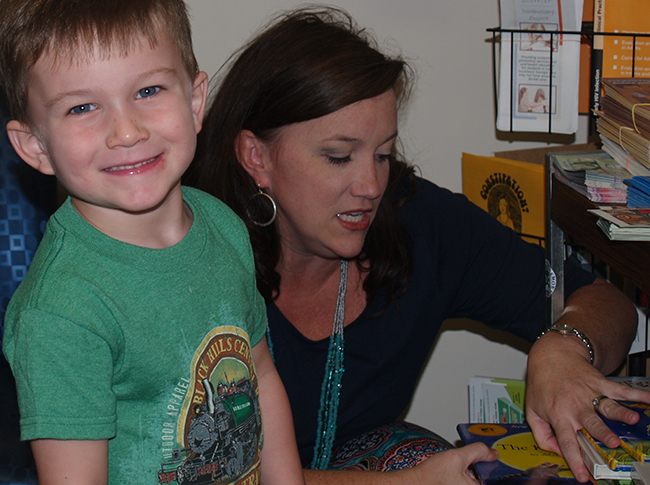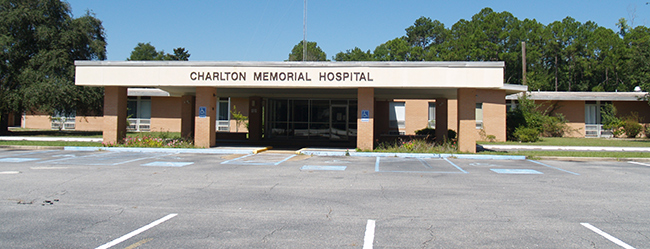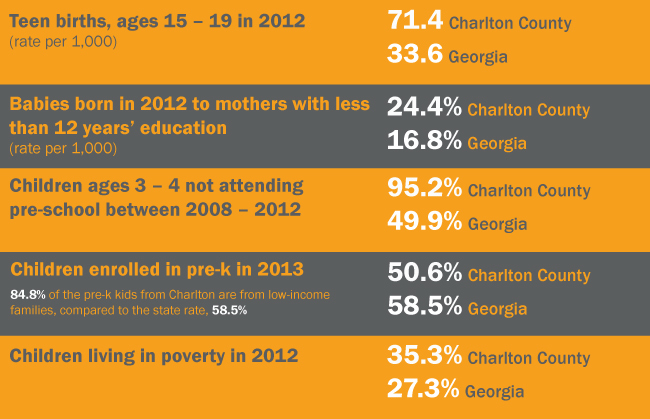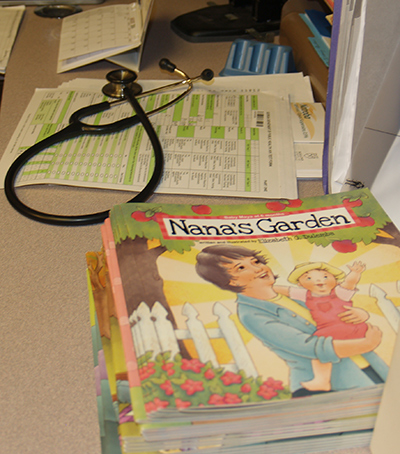Charlton County Strives to Get More Books in the Hands of Parents and Children
Print This Post

BY DIANA ST. LIFER
Some may think the Get Georgia Reading Campaign for Grade-Level Reading’s expectation to get every child in the state on a path to reading proficiently by third grade by 2020 is too ambitious. But one look at the efforts Charlton County Family Connection is making and it’s easy to see that this expectation is well within reach—when dedicated partners are working together on focused strategies.
Just five years ago, only 87 percent of Charlton County’s third graders met or exceeded state standards on the promotional Criterion-Referenced Competency Test (CRCT) in Reading. Last year that number rose to 100 percent. Charlton is one of three counties participating in the Georgia Family Connection Partnership (GaFCP) Early Childhood—Grade-Level Reading cohort. The tri-county initiative may seem like a small effort compared to the statewide Get Georgia Reading Campaign, which launched in August. The mission, however, is the same, and there is no doubt the local-level strategies ultimately will have a positive statewide impact.
Carla Rodeffer, coordinator of the Charlton County Family Connection Collaborative (pictured at top), said The Annie E. Casey Foundation’s investment in the initiative went directly to programs geared directly at improving reading proficiency. Still, the Collaborative needs additional capital to keep current programs going and to get others off the ground.

The key, Rodeffer says, is getting to children the moment they are born—a difficult task exacerbated by the closing of Charlton Memorial Hospital. With the nearest hospital now located approximately 20 miles away in Camden County, mothers and their children have limited access to medical care.
This is just one of the challenges the state’s southernmost county faces.

Where the county doesn’t fall short, however, is in its determination in getting parents to read to their babies and then children reading on their own at an earlier age. Educators and professionals take seriously the research that underscores the importance and benefits of reading to infants and talking with their babies. In addition to a positive impact on language development, reading skills, and socialization, children who are read to at an early age are more likely to succeed in school.
Barbara Hannaford, director of curriculum and instruction for the Charlton County school system, has been an educator and school administrator in the county for 21 years. She describes the Common Core school curriculum as “rigorous” and explains that children are expected to know more at an earlier age. “Mastery of skills is being pushed to younger grade levels,” she said. “That’s why this reading initiative is critical to the success of our students. We know that if our students aren’t reading on grade level by third grade they’re going to struggle in school, and the potential is greater that they will be high school dropouts. It is so imperative to target our earliest readers.”
Hannaford wrote the $240,000 Striving Readers grant for children from birth to age 5 that the county received this summer. It was during her research in applying for the grant that Hannaford learned about the low number of children in pre-school. “I was surprised at how many of our children don’t attend pre-school,” she said. According to Georgia KIDS COUNT data, a staggering 95.2 percent of 3- and 4-year-olds in Charlton County were not in pre-school from 2008-2012, and only 50.6 percent were enrolled in the Georgia Pre-K program. “We need to get the word out to parents that their children need to be in pre-school,” Hannaford said.
The Striving Readers grant will be used to bring more books and printed materials, SMART Boards, and other technology into pre-schools, as well as for staff development so teachers can employ the most effective early literacy strategies. Money also will be used to pay the Ferst Foundation Readers Program registration for every pre-K and Head Start student this year, giving 163 children the opportunity to receive a book every month up until age 5. “We are hoping this will help families start libraries at home for their little ones,” Hannaford said. “It creates enthusiasm for the children when they receive a book of their very own in the mail.”

The timing of the Striving Readers grant coincided perfectly with the Family Connection Collaborative’s reading initiatives, including a family summer reading program at the public library and purchasing books for the Health Department to expose children to the joys of reading.
Rodeffer said future plans include offering parent education through the WIC program and perinatal case management, expanding the Babies Can’t Wait home-visitation program, and a offering a GED scholarship program for parents. But support, she says, from local businesses and community partners is crucial to keep programs running and the county’s children reading proficiently at an earlier age. “Once the grants run out,” Rodeffer said, “We depend on the generosity of the community for financial support.”
Diana St. Lifer is a professional writer with more than 25 years’ experience. She holds a bachelor’s degree in communications, a post-B.A. certificate in child advocacy, and is a certified professional life coach who specializes in teen and adolescent issues.
Reading to her four young children in the 1950s wasn’t an option for MandaLee Johns. “Back then most people didn’t have books in their homes,” said the 82-year-old Folkston resident. “We just couldn’t afford them at the time.” Sadly, families in Charlton County are in the same predicament, today.
Read “Great Grandmother Embraces Second Chance at Spreading the Magic of Stories.”
Low birthweight, childhood obesity, and a literacy gap are serious threats to the well-being of Georgia’s families and children. Recognizing the impact these pressing issues have on the state’s health, safety, and ability to prosper, Georgia Family Connection Partnership has launched three initiatives dedicated to developing and implementing strategies that address these key indicators.
Read “Eleven Family Connection Collaboratives Team Up to Tackle Key Indicators of Child and Family Well-Being.”
